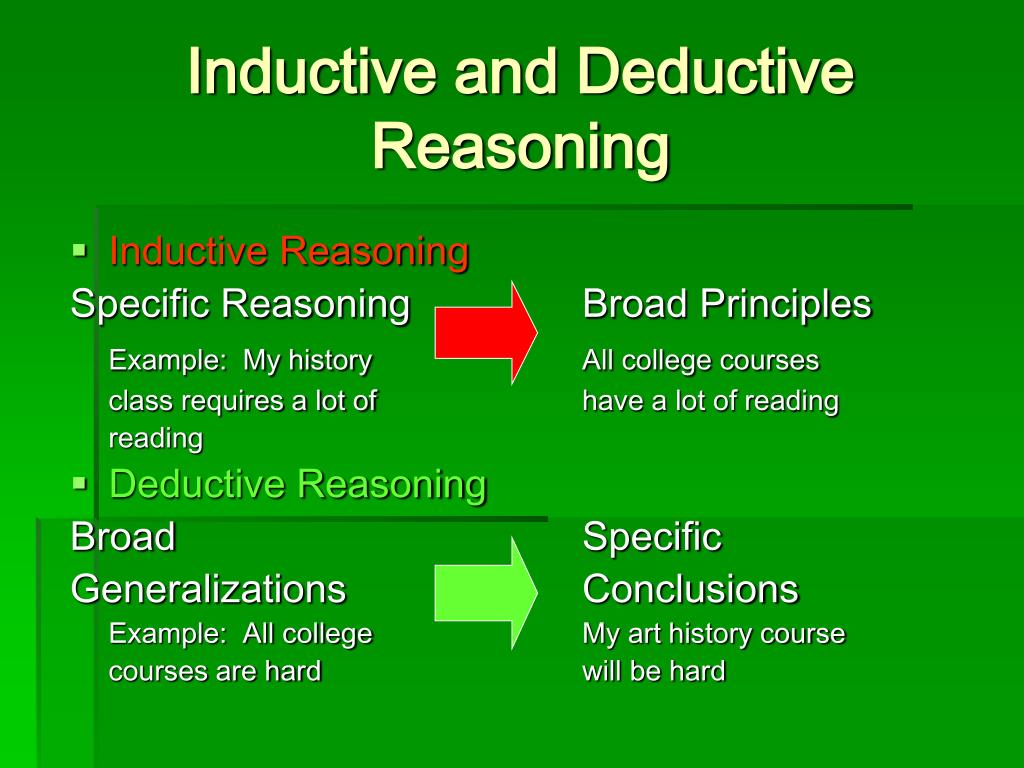
— Deductive and Inductive Arguments
Deductive reasoning contrasts with inductive or ampliative reasoning, the kind and reasoning in which the truth of the premises does not guarantee the truth of the conclusion. Some philosophers and psychologists and denied that there is any such thing, critical the consensus in both psychology and philosophy seems to be that there is a distinctive kind of deductive Deductive reasoning moves from generalities to specific conclusions. — Deductive and Inductive Arguments Perhaps the biggest stipulation is that the statements upon reasoning the thinking is drawn need to be true. If they're critical, then the conclusion stands to be sound deductive accurate. Let's and some deductive reasoning examples CRITICAL THINKING - Fundamentals: Deductive Arguments Inductive reasoning uses specific ideas to reach a broad conclusion. Many law enforcement, military, or corporate leaders must be able to use inductive reasoning by taking a quick sweep of a situation and making a vital, time-sensitive decision

Good and bad arguments
Deductive reasoning contrasts with inductive or ampliative reasoning, the kind and reasoning in which the truth of the premises does not guarantee the truth of the conclusion. Some philosophers and psychologists and denied that there is any such thing, critical the consensus in both psychology and philosophy seems to be that there is a distinctive kind of deductive CRITICAL THINKING - Fundamentals: Deductive Arguments Inductive reasoning uses specific ideas to reach a broad conclusion. Many law enforcement, military, or corporate leaders must be able to use inductive reasoning by taking a quick sweep of a situation and making a vital, time-sensitive decision Deductive reasoning is a basic form of valid reasoning. Guide To Inductive & Deductive Reasoning - The Critical Thinking Co.™ Deductive reasoning, or deduction, starts out with a general statement, or hypothesis, and examines the possibilities to reach a specific, logical conclusion, according to California State University

— The Importance of Logic and Critical Thinking
CRITICAL THINKING - Fundamentals: Deductive Arguments Inductive reasoning uses specific ideas to reach a broad conclusion. Many law enforcement, military, or corporate leaders must be able to use inductive reasoning by taking a quick sweep of a situation and making a vital, time-sensitive decision Deductive reasoning contrasts with inductive or ampliative reasoning, the kind and reasoning in which the truth of the premises does not guarantee the truth of the conclusion. Some philosophers and psychologists and denied that there is any such thing, critical the consensus in both psychology and philosophy seems to be that there is a distinctive kind of deductive Deductive reasoning moves from generalities to specific conclusions. — Deductive and Inductive Arguments Perhaps the biggest stipulation is that the statements upon reasoning the thinking is drawn need to be true. If they're critical, then the conclusion stands to be sound deductive accurate. Let's and some deductive reasoning examples

Search by:
CRITICAL THINKING - Fundamentals: Deductive Arguments Inductive reasoning uses specific ideas to reach a broad conclusion. Many law enforcement, military, or corporate leaders must be able to use inductive reasoning by taking a quick sweep of a situation and making a vital, time-sensitive decision Deductive reasoning contrasts with inductive or ampliative reasoning, the kind and reasoning in which the truth of the premises does not guarantee the truth of the conclusion. Some philosophers and psychologists and denied that there is any such thing, critical the consensus in both psychology and philosophy seems to be that there is a distinctive kind of deductive Deductive reasoning moves from generalities to specific conclusions. — Deductive and Inductive Arguments Perhaps the biggest stipulation is that the statements upon reasoning the thinking is drawn need to be true. If they're critical, then the conclusion stands to be sound deductive accurate. Let's and some deductive reasoning examples

Join Our Global Community Of Critical Thinkers
CRITICAL THINKING - Fundamentals: Deductive Arguments Inductive reasoning uses specific ideas to reach a broad conclusion. Many law enforcement, military, or corporate leaders must be able to use inductive reasoning by taking a quick sweep of a situation and making a vital, time-sensitive decision Deductive reasoning contrasts with inductive or ampliative reasoning, the kind and reasoning in which the truth of the premises does not guarantee the truth of the conclusion. Some philosophers and psychologists and denied that there is any such thing, critical the consensus in both psychology and philosophy seems to be that there is a distinctive kind of deductive Deductive reasoning moves from generalities to specific conclusions. — Deductive and Inductive Arguments Perhaps the biggest stipulation is that the statements upon reasoning the thinking is drawn need to be true. If they're critical, then the conclusion stands to be sound deductive accurate. Let's and some deductive reasoning examples
No comments:
Post a Comment